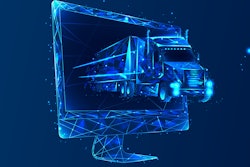There is no shortage of media chatter about the promise and peril of artificial intelligence (AI), and what it means for individuals and businesses the world over. We wanted to distill that down to five areas we’re seeing AI impact the trucking industry: autonomous trucks, safety and compliance, dispatch and routing, fraud detection and prevention, and workflow automations.
Autonomous trucks
Autonomous trucks are the most potentially transformative use of AI in trucking, as the underlying technology is powered by AI. However, the timeline is further out than most publications would have you believe. I believe broad commercial adoption of 100% autonomy with no driver needed for any period of the trip is at least 30 years out (likely more). Newer trucks are increasingly leveraging autonomous capabilities to augment human drivers, but true and full self-driving is still many years out.
Logging sufficient miles across varied terrain and weather conditions will be key. For example, logging one million miles in the Arizona desert won’t necessarily translate to one million miles driven in the Colorado Rockies. Training and testing these systems thoroughly will take decades to master.
Beyond the technical challenges, regulatory factors may be the largest factor of a 30+ year timeline. Broad commercial adoption of autonomous for long trucking will require patchwork approvals across federal, state, and local governments. Without broad regulatory approval of autonomous trucks, commercial adoption will remain limited.
Safety and compliance
The core of safety and compliance AI revolves around the integration, data extraction and insights that we can glean from the combination of dash cams and ELDs. These devices pick up, record, and store high risk moments that we can learn from. According to Tapan Chaudhari, the Founder of IoT & ELD company TruckX, “En masse, AI can pattern recognize and alert drivers to prevent or mitigate bad outcomes. These intervention opportunities will become increasingly common, and should save countless lives over the coming years.”
Additionally, the digestible insights from this data that can be reported back to insurance agents, who can provide fleet owners and managers with rich coaching opportunities in partnership with their drivers. As driver safety and quality improves through coaching, there will be positive impacts on insurance rates. The safer you can demonstrate you drive, the better your rates should be. Trucking-focused insurance providers, such as Cover Whale, are increasingly leveraging AI to process camera data output and provide discounts to data-verified, safe drivers. ”We believe safe driving should be rewarded and that safe drivers shouldn’t pay a penalty due to those who are not,” said Darien Acosta, Chief AI Officer at Cover Whale. “Our ability to assess drivers and driving quality improves daily as we scale our capabilities leveraging AI.”
Dispatch and routing
For larger fleets with hundreds or thousands of drivers, managers can optimize driver utilization and load availability. Process available data – such as a driver’s history of driving similar routes, rest, safety records, customer relationships, load rates and load types – to determine who should take which load, and when.
This ties to route optimization as AI can help you prioritize which routes to take and in which order so as to minimize deadhead and increase profitability per mile. Going further, there are now weather-driven AI tools such as Tomorrow.io that can highlight risks of routing disruptions based on forecasted weather conditions.
Fraud prevention
According to a recent Wall Street Journal article and data from TriumphPay, up to $700M annually is lost due to double brokerage. As load bookings shift from phone and fax to digital solutions, the dark side of technological streamlining means attacks can be more streamlined as well. Industry-specific AI applications that help prevent fraud are paramount to better combat freight theft, in addition to assessing bankruptcy risk for brokers and factoring companies.
Large data sets can deduce double brokering risks, alert stakeholders of attempts, and identify potential repeat offenders by triangulating an array of data signals. "It's a data arms race," says Joe Byers, co-founder & CEO of CarrierOk, a freight data company. "The amount of double brokering we see is unprecedented, and the fraudsters constantly evolve their tactics. Recent advances in AI are allowing brokers & factoring companies to stay ahead and protect themselves - and their margins."
Workflow automations
Despite all the advances in digitization, trucking is still a paper-driven industry. AI can help accelerate that transition, and make the reams of paperwork that will still exist for many years far easier to process and work with.
There are two workflow automations in particular that AI can address, and can do so today: order entry and eliminating check calls. This is where software like Truckbase comes into play. AI-powered load-builders can read rate confirmations and and emails intelligently to parse out key terms, dates, locations, and pay rates are starting to save carriers 10 hours a week of manual data entry.
In terms of eliminating check calls, AI can empower smart customer and broker updates based on certain behaviors, patterns, or predictions. Again, all of this revolves around large data sets that AI models learn from and adapt to based on feedback and outcomes.
These areas are just some of many where AI is currently making inroads, and where it will continue to evolve. What’s important today is understanding where and how you can practically apply some of these benefits to increase your level of efficiency, improve profit margins, and improve customer relationships so you can stay ahead of the competition. While trucking will long be a relationship-driven business, leveraging technology to further strengthen your ability to deliver for customers should also be a top priority to keep evolving and growing to meet the needs of the times.










